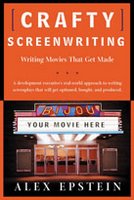
Alex Epstein asks: "Will you write a bit about your transition from comics to screen? A number of TV writers are moving in the other direction, and I'm testing the waters, so I'd love to know your thinking..." [Alex is head writer on an innovative show called Charlie Jade and author of the book 'Crafty Screenwriting: Writing Movies That Get Made'. Check out his blog at http://complicationsensue.blogspot.com - okay?]
Let's deal with the party of the first part first - me. I guess I am in transition from comics to screen, though it feels like I'm only a few steps down a very long road. I spent the 90s as a comics editor in London, first on the Judge Dredd Megazine and then on the legendary science fiction weekly 2000 AD. I quit to become a freelancer five years ago and have been banging my head against a wall ever since, trying to penetrate the magic circle of TV writing in Britain. I kept getting close but certainly lacked the craft to make a success of any opportunities that came my way. Who you know will get you chances, but what you know will turn those chances into commissions. I knew a few people, but lacked the craft to exploit my chances.
I'd almost given up on film and TV when earlier this year I heard Edinburgh's Napier University was launching an MA Screenwriting course, as part of a new Scottish Film Academy being established on campus. This was my chance to get the craft skills I lacked and to build up a fresh network of contacts. I'll be 40 next year, it was time to get my shit together or get off the pot. The fact I'd worked in comics was of no interest to my tutors when I applied for the course. But writing and editing scripts for comics do give you a lot of skills that are eminently transferrable to screenwriting [and I guess the reverse is just as true - but I'll tackle the other side of the coin in my next posting].
Like screenplays, scripts for comics are a blueprint for a visual storytelling medium. But comics are like watching a film during a lightning story or while standing beneath a strobe light. You only get to see glimpses, moments, flashes of the action. What happens in the gaps between the comic strip panels is almost as important as what is seen within the panels. This is particularly true of British comics like 2000 AD or the Megazine, which have episodes so short that sometimes resemble haiku to the rambling sonnets published by Marvel, DC and their US colleagues. An average story instalment in 2000 AD is five or six pages long - that's 36 panels at most to tell a tale with a beginning, middle and end, some plot progression if it's part of an on-going serial, some character moments, some stunning visuals to keep the artist interested and doing his best work. If it is part of a larger story, you have to resolve the cliffhanger from the previous episode, set up the cliffhanger for this episode and somehow include all that other stuff I mentioned in the previous sentence. Yikes!
It's no surprise that perhaps 25 writers in British comics have made enough money to call it their career in the past 25 years. It's even less of a surprise most of them end up working for the Yankee dollar to make real money - there simply isn't enough work on this side of the Atlantic to sustain them all. The UK is lucky if one great writer emerges each year. But it takes them several years and hundreds of published pages before they start producing their best work. Alan Moore wrote 50 one-off short stories for 2000 AD, Grant Morrison a not dissimilar amount. The need for such intense creativity in such a confined space is the perfect training ground.
Personally, I struggle to be so concise. My best scritp writing in comics has been for The Phantom, an old pulp character who's still going strong in places like Australia, Scandinavia and other random territories. I've written 20 issues of The Phantom to date and I thoroughly enjoy that as a job. Uniquely, each story is written as a full script, but I don't stipulate pages breaks. I simply write from panel 1 to panel 200 (or thereabouts), leaving to the artist to divide these into 32 pages of strip. Most stories are published as complete tales, singles, done-in-one efforts. It's remarkably liberating to start at the beginning, end at the end and not have to worry about cliffhangers, page breaks or trying to impress readers, reviewers and your peers with a stunning array of page to page transitions. With The Phantom, you just tell the bloody story and that's it - no airs and graces, no fancy footling, none of that post-Watchment look-at-me-I'm-so-bloody-clever bollocks.
Just tell a story! That's all the reader cares about, a good story, well told.
Got to go, time for coffee and cake (or probably a satsuma, to shift the post-xmas satsuma mountain).
I shall return to this subject in my next post. Honest.
No comments:
Post a Comment